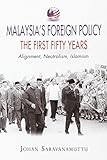Malaysia's Foreign Policy, the First Fifty Years : Alignment, Neutralism, Islamism / Johan Saravanamuttu.
Material type: TextPublisher: Singapore : ISEAS Publishing, [2010]Copyright date: ©2010Description: 1 online resource (416 p.)Content type:
TextPublisher: Singapore : ISEAS Publishing, [2010]Copyright date: ©2010Description: 1 online resource (416 p.)Content type: - 9789814279789
- 9789814279802
- HG327
- DS597.2 .S276 2010
- online - DeGruyter
| Item type | Current library | Call number | URL | Status | Notes | Barcode | |
|---|---|---|---|---|---|---|---|
 eBook
eBook
|
Biblioteca "Angelicum" Pont. Univ. S.Tommaso d'Aquino Nuvola online | online - DeGruyter (Browse shelf(Opens below)) | Online access | Not for loan (Accesso limitato) | Accesso per gli utenti autorizzati / Access for authorized users | (dgr)9789814279802 |
Browsing Biblioteca "Angelicum" Pont. Univ. S.Tommaso d'Aquino shelves, Shelving location: Nuvola online Close shelf browser (Hides shelf browser)

|

|

|

|

|

|

|
||
| online - DeGruyter Nowhere to Hide : The Great Financial Crisis and Challenges for Asia / | online - DeGruyter Singapore Women's Charter : Roles, Responsibilities and Rights in Marriage / | online - DeGruyter Inclusive, Balanced, Sustained Growth in the Asia-Pacific / | online - DeGruyter Malaysia's Foreign Policy, the First Fifty Years : Alignment, Neutralism, Islamism / | online - DeGruyter Southeast Asian Affairs 2010 / | online - DeGruyter Management of Success : Singapore Revisited / | online - DeGruyter Preserving Cultural Identity through Education : The Schools of the Chinese Community in Calcutta, India / |
Frontmatter -- Contents -- PREFACE -- ACKNOWLEDGEMENTS -- ABBREVIATIONS AND GLOSSARY -- 1. Introduction: Framing the Study of Foreign Policy -- 2. The Ministry of Foreign Affairs -- 3. Engaging the Cold War 1957–63 -- 4. Transition to Neutralism 1964–69 -- 5. Constituting Change with Innovation 1970–75 -- 6. Consolidating Regionalism in a Changing World, 1976–77 -- 7. Confronting Globalization with Iconoclasm, 1981–96 -- 8. Crisis, Recovery, and Denouement of an Era, 1997–2003 -- 9. Embedding Islam, Embracing Globalization, 2004–08 -- 10. Explaining Relations with Neighbours: Antipathies of History, Ethnicity, and Intimacy -- 11. The Political Economy of Foreign Policy: Dilemmas of a Developmental State -- 12. Postscript: The Leadership Change 2009 -- 13. Conclusion: Middlepowermanship in Foreign Policy -- BIBLIOGRAPHY -- Index -- ABOUT THE AUTHOR
restricted access online access with authorization star
http://purl.org/coar/access_right/c_16ec
This book captures Malaysia's foreign policy over the first fifty years and beyond since the date of the country’s formal independence in 1957. The author provides "macro-historical" narratives of foreign policy practices and outcomes over distinct time periods under the tenures of the five prime ministers. One chapter delves into relations with immediate neighbouring states and another chapter analyses the political economy of foreign policy. A postscript deals with the transition of foreign policy beyond the fifth decade. The concluding chapter suggests that Malaysian middlepowermanship has been in the making in foreign policy practice being particularly evident since the Mahathir years. Employing a critical-constructivist approach throughout the study, the author posits that foreign policy should be appreciated as outcomes of socio-political-economic processes embedded within a Malaysian political culture. In terms of broad policy orientations, Malaysian foreign policy over five decades has navigated over the terrains of neutralism, regionalism, globalization and Islamism. However, the critical engagement of civil society in foreign policy construction remains a formidable challenge.
Mode of access: Internet via World Wide Web.
In English.
Description based on online resource; title from PDF title page (publisher's Web site, viewed 01. Dez 2022)


